小学英语三到六年级问句答句大集锦
小学英语特殊疑问句和一般疑问句的归纳

特殊疑问句和一般疑问句的答法一般疑问句通常都是 1..以be (am,is,are,)开头2.以Do,Does,Did 开头或以Can开头回答方法:前面用什么提问的就用什么答。
只有两种回答方式:1)肯定的, Yes,主语 + 提问词.2)否定的 No,主语+提问词+not.【注意:问句与答句的第一二人称要互换】如:④主语是名字时的答语:看性别,男的用he ,女的用she ,其他的用it 复数就用they。
如:①Is she…… Is he……… Is it……..Yes, she is. Yes, he is. Yes, it is.No, she isn,t. No, he isn,t. No, it isn,t.②Are they……… Are the monkeys …….Yes, they are. Yes, they are.No,they aren’t No,they aren’t③ Do they……… Does he…….. Did she…….Yes,they do. Yes,he does. Yes, she did.No,they don’t. No,he doesn’t. No,she didn’t.④Are you…….. Are you…….. Do you…….Yes, I am. Yes, we are. Yes ,I do. 或 Yes,No, I am not. No, we aren’t. No,I don’t. 或No,⑤Does Mike……. Is ChenJi….. Do your parents…Yes ,he does. Yes , she is. Yes, they do.No,he doesn’t. No, she isn’t. No,they don’t.111v1.0 可编辑可修改一、专项练习。
1. Did ChenJie read books yesterday2. Can the girl cook the meals—————————————————————————————he going to swim this afternoon 4. Are they going to take a trip next weekend ————————————————————————————————5.Does he often go to school by bike 6. Do you play basketball every weekend ———————————————————————————————————7. Did Mike do his homework yesterday 8. Are they playing basketball now————————————————————————————————一般疑问句及特殊疑问句的总结一般疑问句的定义:用yes或no来回答的疑问句叫一般疑问句。
全讲全练:小学英语疑问句全解析

边讲边练:疑问句全面解析1.—Did you fly a kite last Sunday?—__________________A.Yes, I was.B.No, I didn't.C.Yes, I didn't.全面分析:-你上周日放风筝了么?-不,我没有。
这是一个一般疑问句,使用did提问应该使用did回答,而否定与肯定前后应该对应,故选B。
2.—________ will you do this evening?—I will watch TV.A.Who B.What C.When全面分析:—今晚你将干什么?—我将看电视。
A.谁;B. 什么;C. 什么时候,根据答语得知询问干什么,故选B。
3._______was your summer holiday?()A.Who B.How C.What全面分析:How was your summer holiday? 你的暑假过得怎么样?4.—I want to make a cake.What do I need?—A.You like milk.B.You need some eggs and milk.C.I like eggs.全面分析:—我想做个蛋糕。
我需要什么?— 选项A你喜欢牛奶。
选项B你需要一些鸡蛋和牛奶。
选项C我喜欢蛋。
根据问句句意,可知选项B符合题意,故选B.5.—Did he go boating last weekend?—A.Yes, he is.B.Yes, he did.C.No, he doesn't.全面分析:——他上周末去划船了吗?——是的,他去了。
根据Did引导的一般疑问句可知,要使用肯定回答Yes,he did。
故选B。
6.— _____ are you doing?— I am writing an email. ()A.What B.Where C.How全面分析:你在干什么?我正在发邮件。
小学英语一般疑问句和特殊疑问句(附练习题)
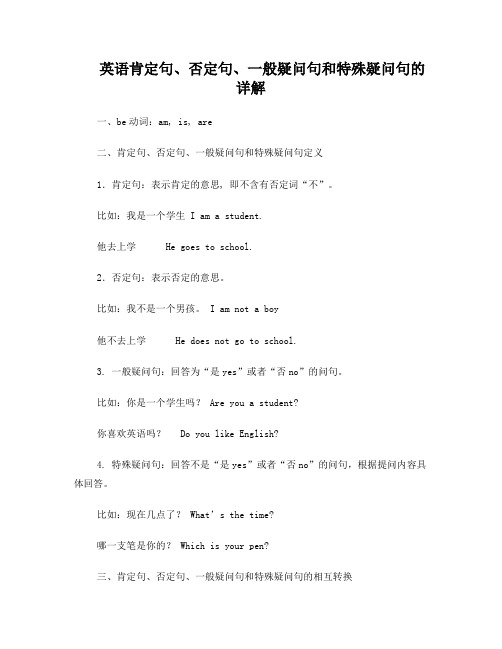
英语肯定句、否定句、一般疑问句和特殊疑问句的详解一、be动词:am, is, are二、肯定句、否定句、一般疑问句和特殊疑问句定义1.肯定句:表示肯定的意思, 即不含有否定词“不”。
比如:我是一个学生 I am a student.他去上学 He goes to school.2.否定句:表示否定的意思。
比如:我不是一个男孩。
I am not a boy他不去上学 He does not go to school.3. 一般疑问句:回答为“是yes”或者“否no”的问句。
比如:你是一个学生吗? Are you a student?你喜欢英语吗? Do you like English?4. 特殊疑问句:回答不是“是yes”或者“否no”的问句,根据提问内容具体回答。
比如:现在几点了?What’s the time?哪一支笔是你的? Which is your pen?三、肯定句、否定句、一般疑问句和特殊疑问句的相互转换有am, is, are的句子,肯定句变否定句:在am, is, are后面加上not,其余按顺序照抄。
肯定句变一般疑问句:把am, is, are提前放到句首并大写Am, Is, Are,其余照抄。
肯定句变特殊疑问句(就划线部分提问):分3步骤第一步:先变一般疑问句第二步:找合适的特殊疑问词代替划线部分第三步:特殊疑问词提前放到句首,并大写,其余按顺序照抄,省略划线部分。
注意:1.一定先变一般疑问句。
但是,如果问的是主语或主语的定语时,语序不变,为"特殊疑问词(+主语)+陈述句"。
如:Li ming 's not here today. Who's not here today? 今天谁没来?2.划线部分不能在特殊疑问句中出现。
when 什么时间(问时间)what date 什么日期问具体日期who 谁(问人)what place什么地点问具体地址whose 谁的问主人how …怎么样问情况where 在哪里问地点how old 多大问年龄which 哪一个问选择how many 多少问数量例如:1.肯定句、否定句和一般疑问句的互换肯定句:This is a book.否定句:This is not a book.一般疑问句:Is this a book?肯定回答:Yes, it is.否定回答:No, it isn’t.2.就划线部分提问(变特殊疑问句)This is a book.第一步:变一般疑问句 Is this a book?第二步:找合适的特殊疑问词 Is this what ?第三步:特殊疑问词提前放到句首,并大写,其余按顺序照抄,省略划线部分。
小学六年级下册英语复习资料

WORD格式 专业资料整理 Unit1Howtallareyou? 一.如何询句并表达某人的身高或体重等。 问句:How+形容词(tall,heavy...)+be动词+主语? 答句:主语+be动词+数字+计量单位(metres米,kilograms千克,tom吨...)(+形容词 tall,heavy) 注意:1.be动词随主语的变化而变化
2.当计量单位前面的数字大于1时,计量单位用复数,当计量单位前面的数字小于或 等于1时,计量单位用复数。
3.当计量单位为缩写时(metre为m,kilogram为kg),不管前面的数字是大于、小于还 是等于1,后面都不能加S 例句:Howheavyareyou? I’m45kilograms Howtallisshe? Sheis1.5metrestall(tall可省略) 二.询问对方穿多大码的鞋子 问句:Whatsizeareyourshoes? 答句:Iwearsize+数字(+shoes).或Size+数字. 例句:Whatsizeareyourshoes? Iwearsize35shoes。 三.形容词比较级句型结构 A+be动词(am,is,are)(+数字+计量单位)+形容词比较级+than(比)+B 如: I’mtallerandheavierthanyou.(我比你更高和更重。) Anelephantisbiggerthanatiger.(一只大象比一只老虎更大。) Heis2yearsolderthanme.(他比我大2岁) 注意:than后面的人称代词用宾格形式。 形容词的比较级是在形容词的基础上变化而来的,它的变化规则是: ①一般的直接在词尾加er,如tall-taller,strong-stronger, ②以e结尾的,直接加r,如fine–finer, ③以辅音字母加y结尾的,先改y为i再加er,如funny-funnier ④以重读闭音节结尾且词尾只有一个辅音字母,双写该辅音字母再加er,如big–bigger,thin –thinner,hot–hotter 注意:比较的两者应该是互相对应的可比较的东西。 典型错误:Myhairislongerthanyou.(我的头发比你更长。) 比较的两者是我的头发、你(整个人),那么比较的对象就没有可比性。 应该改为:Myhairislongerthanyours.或Myhairislongerthanyourhair. 四.Some一些,若干。可作限定词、代词。 例句:Iwantsomepencils.(作限定词) Therearesomeinthebox.(作代词,代指一些东西) 注意:当some作限定词时一般用于肯定句中,当含有some的肯定句变成否定句时,some 通常要变成any. 例句:Therearesomeflowersthere>Therearen’tanyflowersthere. 但在表示建议、请求或希望得到对方肯定回答的疑问句中也要用some. 例句:CanIhavesomeapples?Yes,please.WORD格式 专业资料整理 五.一般现在时 一般现在时基本用法介绍 4.表示事物或人物的特征、状态。如:Theskyisblue.天空是蓝色的。 5.表示经常性或习惯性的动作。如:Igetupatsixeveryday.我每天六点起床。 6.表示客观现实。如:Theearthgoesaroundthesun.地球绕着太阳转。 一般现在时的构成 1.be动词:主语+be(am,is,are)+其它。如: Iamaboy.我是一个男孩。 2.行为动词:主语+行为动词(+其它)。如: WestudyEnglish.我们学习英语。 当主语为第三人称单数(he,she,it)时,要在动词后加"-s"或"-es"。如:MarylikesChinese. 玛丽喜欢汉语。 一般现在时的变化 1.be动词的变化。 否定句:主语+be+not+其它。 如:Heisnotaworker.他不是工人。 一般疑问句:Be+主语+其它? 如:-Areyouastudent? -Yes.Iam./No,I'mnot. 特殊疑问句:疑问词+一般疑问句?如:Whereismybike? 2.行为动词的变化。 否定句:主语+don't(doesn't)+动词原形(+其它)。如: Idon'tlikebread. 当主语为第三人称单数时,要用doesn't构成否定句。如: Hedoesn'toftenplay. 一般疑问句:Do(Does)+主语+动词原形+其它。如: -Doyouoftenplayfootball? -Yes,Ido./No,Idon't. 当主语为第三人称单数时,要用does构成一般疑问句。如: -Doesshegotoworkbybike? -Yes,shedoes./No,shedoesn't. 特殊疑问句:疑问词+一般疑问句。如:Howdoesyourfathergotowork? 动词+s(第三人称单数)的变化规则 1.一般情况下,直接加-s,如:cook-cooks,milk-milks 2.以s.x..sh.ch.o结尾,加-es,如:guess-guesses,wash-washes,watch-watches,go-goes 3.以“辅音字母+y”结尾,变y为i,再加-es,如:study-studies
小学英语一般疑问句练习题及答案
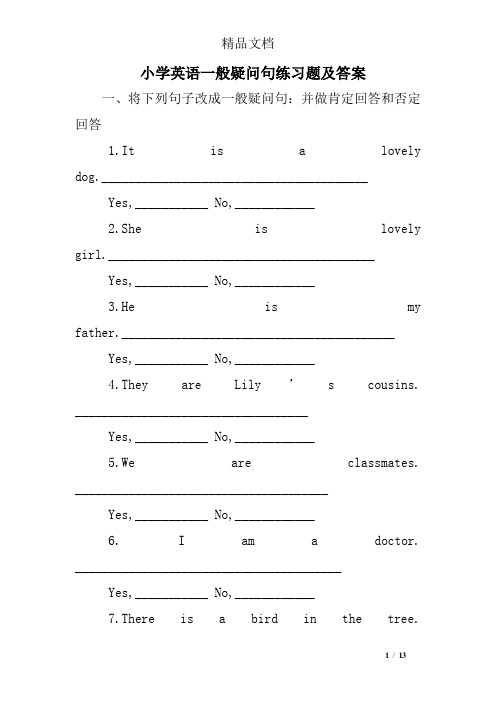
小学英语一般疑问句练习题及答案一、将下列句子改成一般疑问句:并做肯定回答和否定回答1.It is a lovely dog.________________________________________Yes,___________ No,____________2.She is lovely girl.________________________________________Yes,___________ No,____________3.He is my father._________________________________________Yes,___________ No,____________4.They are Lily’s cousins. ___________________________________Yes,___________ No,____________5.We are classmates. ______________________________________Yes,___________ No,____________6. I am a doctor. ________________________________________Yes,___________ No,____________7.There is a bird in the tree.________________________________Yes,___________ No,____________8.There are many stars in the sky. ____________________________Yes,___________ No,____________9.They are good friends. ____________________________________Yes,___________ No,____________10. I love my parents. _______________________________________Yes,___________ No,____________11. I play computer games every night. _________________________Yes,___________ No,____________12. There are many books on the shelf. __________________________Yes,___________ No,____________13. There was an ostrich in the zoo. _______________________________Yes,___________ No,____________14. We have a pleasant home. __________________________________Yes,___________ No,____________15. We like to climb the mountain. ______________________________Yes,___________ No,____________16. They go to church on Sunday. ______________________________Yes,___________No,____________17. They walk to school every morning. __________________________Yes,___________ No,____________18. It is a beautiful park. ______________________________Yes,___________ No,____________19. It is a big map. ______________________________Yes,___________ No,____________20. You were a singer. ______________________________Yes,___________ No,____________有be的就be+not没有Be的就在主语的后面+do not或does not把肯定句改为疑问句就是有be的就把be提到前面来,没有be的就在句首加do或 doesEg: I am a teacher. ----I am She likes singing.------She like singing.You are ten.-----Are you ten?They get up at seven o’clock.---- they get up at seven o’clock? 以be 开头的一般问句用 yes , I am / No I’m not ….根据主语回答 Eg: Is He a doctor? Yes ,he is./No he isn’t.Are they /you/ we late? Yes ,they/ you/we are./ No,they /you/we are not.有be的就be+not没有Be的就在主语的后面+do not或does not把肯定句改为疑问句就是有be的就把be提到前面来,没有be的就在句首加do或 doesEg: I am a teacher. ----I am She likes singing.------She like singing.You are ten.-----Are you ten?They get up at seven o’clock.---- they get up at seven o’clock? 以be 开头的一般问句用 yes , I am / No I’m not ….根据主语回答 Eg: Is He a doctor? Yes ,he is./No he isn’t.Are they /you/ we late? Yes ,they/ you/we are./No,they /you/we are not.一、陈述句变一般疑问句练习 1. His father is an English teacher.2. These cats are crying.3. They can swim.4. I like to read English.5. I go to school on foot.6. He likes English.7. His father goes to work by bus.8. He is crying under the tree.9. His birthday is on the twentieth of November.10. Mrs. Li and Kitty are in a big shop.11. Kitty is wearing her new uniform.12. The boy under the tree is hungry.13. He goes to school every day.15. I want to have a model car.16. She wants a cup of coffee.17. Mrs. Li and Kitty watch television at night.18. I do my homework after school二、将下列句子改成一般疑问句:1.It is a lovely dog.________________________________________.She islovelygirl.________________________________________.He is myfather._________________________________________.Th ey are Lily’s cousins. ___________________________________.We are classmates. ______________________________________.I am a doctor. ________________________________________.There is a bird in the tree. ________________________________.There are many stars in the sky. ____________________________.They are good friends. ____________________________________ 10. I love my parents. _______________________________________ 11. I play computer games every night. _________________________ 12. There are many books on the shelf. __________________________ 13. There is an ostrich in the zoo. _______________________________ 14. We havea pleasant home. __________________________________15. We like to climb the mountain. ______________________________ 16. They go to churchon Sunday. ______________________________ 17. They walk to school every morning. __________________________ 18. It is a beautiful park. ______________________________ 19. It is a big map. ______________________________20. You are a singer. ______________________________ 三、用do does be 填空 1> _____ she know all the answers ? Yes , she ____ . No, she _____.> _____ the twins often fight ?Yes ,_____ do. No, _____ don’t.> _____ your dad like listening to music? Yes ,____ does . No, _____ doesn’t.>_____ uncle Tom wash his car everyday? Yes , ____ does . No, ____ doesn’t.> _____ you have a new teacher?Yes , I ______. No, I ______.>_____ she a teacher? Yes, she _____ . No, she _____.> ______ you playing ball now? Yes, I ______. No, I ______.> ______ the pig like to sleep? Yes, it ______. No, it _____.> ______ five birds flying in the sky? Yes, they _____ .No, ____ aren’t.10> _____ your father smoking in the living room? Yes, ____ is .No, he _____.小学英语语法一般疑问句1. 概念能用yes / no回答的问句叫一般疑问句。
小学1-6年级英语问句口语汇总
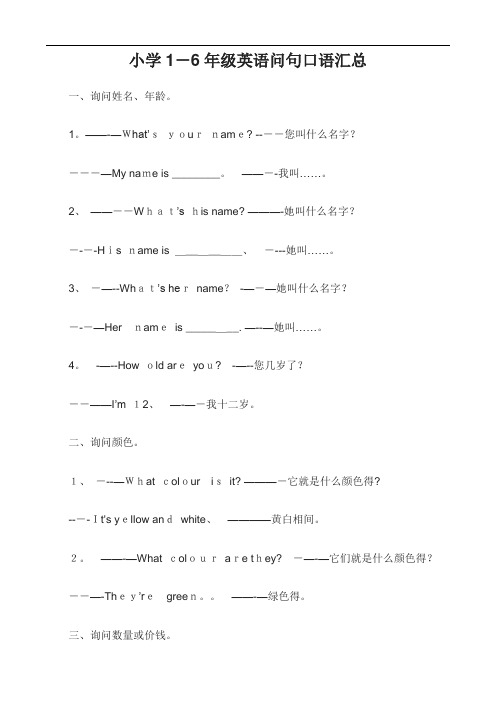
小学1-6年级英语问句口语汇总一、询问姓名、年龄。
1。
——-—What’syourname? ----您叫什么名字?---—My name is ________。
——--我叫……。
2、——--What’s his name? ———-她叫什么名字?----His name is ________、----她叫……。
3、-—--What’s hername?-—-—她叫什么名字?---—Hernameis ________. —--—她叫……。
4。
-—--How old areyou?-—--您几岁了?--——I’m 12、—-—-我十二岁。
二、询问颜色。
1、---—What colour isit? ———-它就是什么颜色得?----It's yellow andwhite、————黄白相间。
2。
——-—What colourare they?-—-—它们就是什么颜色得?--—-They’regreen。
——-—绿色得。
三、询问数量或价钱。
1。
—---How many kites can you see? --——您可以瞧见几只风筝?--—-I cansee12. —--—我可以瞧见十二只风筝。
2、-——-Howmanycrayons do you have?--—-您有多少支彩笔?——--I have16。
-—-—我有十六支。
3。
--—-How manypeople arethere in yourfamily?----您家有几口人?—---Three、----三口人、4. ---— How many horses are there?———-那有多少匹马?—--—Twelve、—---十二匹、5。
-——-How muchis thisdress?----这条连衣裙多少钱?----It’s ninety-nineyuan、-——-九十九元。
6。
—---How much are these apples?---—这些苹果多少钱?--——They’re thirty—five yuan. -—-—三十五元、四、询问时间或日期。
【免费】小学三年级英语语法:一般疑问句及特殊疑问句
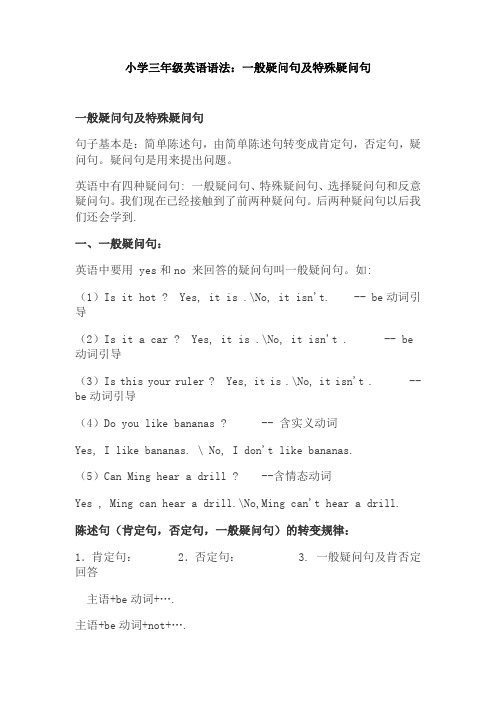
小学三年级英语语法:一般疑问句及特殊疑问句一般疑问句及特殊疑问句句子基本是:简单陈述句,由简单陈述句转变成肯定句,否定句,疑问句。
疑问句是用来提出问题。
英语中有四种疑问句: 一般疑问句、特殊疑问句、选择疑问句和反意疑问句。
我们现在已经接触到了前两种疑问句。
后两种疑问句以后我们还会学到.一、一般疑问句:英语中要用 yes和no 来回答的疑问句叫一般疑问句。
如:(1)Is it hot ? Yes, it is .\No, it isn't. -- be动词引导(2)Is it a car ? Yes, it is .\No, it isn't . -- be动词引导(3)Is this your ruler ? Yes, it is .\No, it isn't . -- be动词引导(4)Do you like bananas ? -- 含实义动词Yes, I like bananas. \ No, I don't like bananas.(5)Can Ming hear a drill ? --含情态动词Yes , Ming can hear a drill.\No,Ming can't hear a drill.陈述句(肯定句,否定句,一般疑问句)的转变规律:1.肯定句: 2.否定句: 3. 一般疑问句及肯否定回答主语+be动词+….主语+be动词+not+….be动词+主语+…?Yes, 主语+be动词./No, 主语+be动词+not.I am a teacher. I am not a teacher. Are you a teacher?--Yes, I am./ No, I am not.My mother is thin. My mother is not /isn'tthin. Is your mother thin?--Yes, she is./ No, she isn't.They are insects. They are not/aren't insects. Are they insects?--Yes. they are./ No, they aren't.主语+情态动词can+…主语+情态动词can+ not+….情态动词can+主语+…?Yes, 主语+情态动词can/No,主语+情态动词can+ notHe can jump. Hecan not/can't jump. Can he jump?--Yes,he can./ No, he can't.主语+动词+….主语+助动词do/does+not助动词do/does+主语+…. 动词原形 +….动词原形?Yes, 主语+助动词do/does.No, 主语+助动词do/does+not.He likes to eat apples. He doesn't like to eat apples. Does he like to eat apples?Yes,he does./ No,he doesn't.We like to eat apples. We don't like to eat apples. Do you like to eat apples?Yes,we do. /No,we don't.二、祈使句:表示请求、命令、建议或劝告等的句子叫祈使句,主语you常省略。
小学英语一般疑问句和特殊疑问句(附练习题)
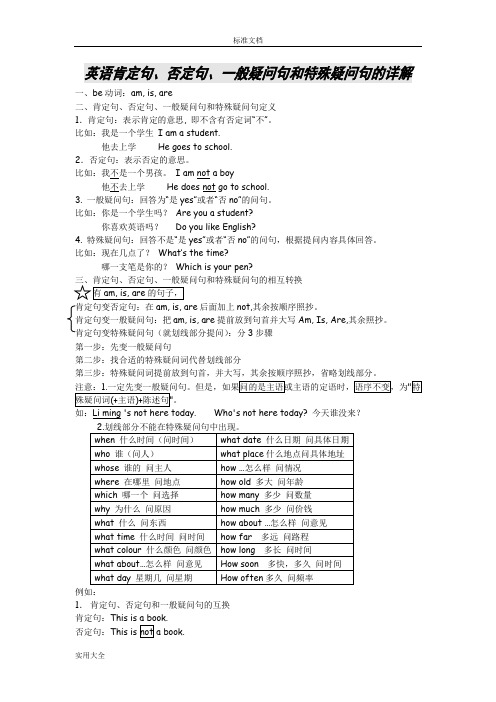
英语肯定句、否定句、一般疑问句和特殊疑问句的详解一、be动词:am, is, are二、肯定句、否定句、一般疑问句和特殊疑问句定义1.肯定句:表示肯定的意思, 即不含有否定词“不”。
比如:我是一个学生I am a student.他去上学He goes to school.2.否定句:表示否定的意思。
比如:我不是一个男孩。
I am not a boy他不去上学He does not go to school.3. 一般疑问句:回答为“是yes”或者“否no”的问句。
比如:你是一个学生吗?Are you a student?你喜欢英语吗?Do you like English?4. 特殊疑问句:回答不是“是yes”或者“否no”的问句,根据提问内容具体回答。
比如:现在几点了?What’s the time?哪一支笔是你的?Which is your pen?am, is, are后面加上not,其余按顺序照抄。
肯定句变一般疑问句:把am, is, are提前放到句首并大写Am, Is, Are,其余照抄。
:分3步骤第一步:先变一般疑问句第二步:找合适的特殊疑问词代替划线部分第三步:特殊疑问词提前放到句首,并大写,其余按顺序照抄,省略划线部分。
如:Li ming 's not here today.Who's not here today? 今天谁没来?例如:1.肯定句、否定句和一般疑问句的互换肯定句:否定句:一般疑问句:Is this a book?肯定回答:Yes, it is.否定回答:No, it isn’t.2.就划线部分提问(变特殊疑问句)This is a book.第一步:变一般疑问句Is this a book?第二步:找合适的特殊疑问词Is this what ?第三步:特殊疑问词提前放到句首,并大写,其余按顺序照抄,省略划线部分。
do not或者does not,其余按顺序照抄动词用原形肯定句变一般疑问句:在句首加do或者does并大写,其余照抄。
- 1、下载文档前请自行甄别文档内容的完整性,平台不提供额外的编辑、内容补充、找答案等附加服务。
- 2、"仅部分预览"的文档,不可在线预览部分如存在完整性等问题,可反馈申请退款(可完整预览的文档不适用该条件!)。
- 3、如文档侵犯您的权益,请联系客服反馈,我们会尽快为您处理(人工客服工作时间:9:00-18:30)。
问句答句:1. -----How do you go to school?-----I usually go to school by bike.2. -----Where is your home?-----It’s near the library.3. -----What are you going to do this weekend?-----I’m going to visit my grandparents. / I want to buy a pair of shoes.4. -----What are you going to buy?-----I’m going to buy an English book.5. -----When are you going?-----I’m going at 7 o’clock.6. -----How can I get to the museum?-----You can go by the No.15 bus.7. -----Can I go on foot?-----Sure, it’s not far. / Sure, if you like.8. -----Is it far? /Is it far from here?-----Yes, it is. / No, it’s not far.9. -----Who is your Chinese teacher?-----Mr Zhang.10. -----What’s he like?-----He is tall and thin.11. -----What’s she like?-----She is very friendly.12. -----What’s your favourite food?-----My favourite food is fish.13. -----What’s your favourite fruit?-----My favourite fruit is grapes.14. -----What do you have for lunch today?-----I have tomatoes and beef.15. -----What would you like for lunch?-----I’d like some mutton and potatoes.16. -----What day is it today?-----It’s Wednesday.17. -----What do you have on Mondays?-----We have English, Chinese and science.18. -----What do you do on Saturdays?-----I often do my homework.19. -----What can you do?-----I can sweep the floor.20. -----Are you helpful at home?-----Sure. / Of course.21. -----Can you set the table?-----Yes, I can. / No, I can’t.22. -----Is this your bedroom?-----Yes, it is. / No, it isn’t.23. -----Where is the air-conditioner?-----It’s on the wall.24. -----Is there a river in the park?-----Yes, there is. / No, there isn’t.25. -----Are there any fish in the rivers?-----Yes, there are. / No, there aren’t.26. -----When do you get up?-----At 7 o’clock.27. -----What’s your favourite season?-----My favourite season is summer.28. -----Which season do you like best?-----I like summer best.29. -----Why do you like summer?-----Because I can swim.30. -----When is your birthday?-----My birthday is in June. / My birthday is June 8th.31. -----Is your (her/his/ your father’s/your mother’s)birthday in October?-----Yes, it is. / No, it isn’t.32. -----What’s the date?-----It’s March 12th.33. -----Who has a birthday in July?-----Me.34. -----What are you doing?-----I’m reading a book.35. -----What is he (your father/ brother/Zhangpeng)doing?-----He is cleaning the room.36. -----What is she(your mother/sister/Amy) doing?-----She is washing clothes.37. -----Can I speak to Sarah?-----Please hold on.38. -----What is it(the elephant) doing?-----It’s running.39. -----What are they doing?-----They are drinking water.40. -----What do you see?-----I see some monkeys.41. -----What can you see in our classroom?-----I can see many desks and chairs.42. -----Are you eating lunch?-----Yes, I am. / No, I’m not. / Yes, we are. / No, we aren’t.43. -----Are they playing football?-----Yes, they are. / No, they aren’t.44. -----Is he cleaning the windows?-----Yes, he is. / No, he isn’t.45. -----Is she writing a letter?-----Yes, she is. / No, she isn’t.46. -----We have a new classroom.-----Really? Let’s go and see. /Let’s go and have a look.47. -----Let’s clean the desks and chairs.-----All right. / Ok. / Good idea.48. -----How many books do you have?-----I have 12.49. -----How many rulers do you see?-----I see 12.50. -----May I have a look?-----Sure, here you are.51. -----What colour is it? / What colour is the bag?-----It’s blue.52. -----What’s in your schoolbag?-----An English book and a pencil box.53. -----What’s his name?-----His name is Mike.54. -----What’s her name?-----Her name is Bai Ling.55. -----Who is he?-----He is Mike. / His name is Mike.56. -----Who is she?-----She is Amy. / Her name is Amy.57. -----Is he Zhangpeng?-----Yes, he is. / Yes, you are right. / No, he isn’t.58. -----Is she Sarah?-----Yes, she is. / Yes, you are right. / No, she isn’t. 59. -----Is this(that) your earser?-----Yes, it is. / No, it isn’t.60. -----Are they on the table?-----Yes, they are. / No, they aren’t.61. -----Can I have some noodles?-----Sure. Here you are.62. -----Can I help you?-----Yes, please. / No, thanks.63. -----What’s your father(brother)?-----He is a doctor.64. -----What’s your mother(sister)?-----She is a farmer.65. -----Do you have a storybook?-----Yes, I do. / No, I don’t.66. -----What time is it?-----It’s 6:30.67. -----What’s this?-----It’s a T-shirt.68. -----What are they(these/ those)?-----These are shoes.69. -----Whose is it?-----It’s my shirt.70. -----What’s the weather like today?-----It’s sunny. / It’s warm.71. -----How much is it(the skirt)?-----It’s 20yuan.72. -----How much are they(the socks)?-----They are 40yuan.73. -----Are these(those) tomatoes?-----Yes, they are. / No, they aren’t.74. -----Where are you from?-----I’m from China.75. -----Good morning.----- Good morning.76. -----Good afternoon.----- Good afternoon.77. -----How are you?-----I’m fine. Thank you. / Fine, thanks. / Very well, thanks.78. -----How old are you?-----I’m 12 years old.79. -----Nice to meet you. / Nice to see you.-----Nice to meet you, too. / Nice to see you, too.80. -----This is my friend, Amy.-----Nice to meet you.81. -----Do you like apples?-----Yes, I do. / No, I don’t. / Sorry, I don’t like apples. 82. -----Have some apples.-----Thank you.83. -----Look at the bear.-----It’s fat.。
